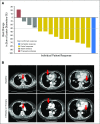Dabrafenib and Trametinib Treatment in Patients With Locally Advanced or Metastatic BRAF V600-Mutant Anaplastic Thyroid Cancer
- PMID: 29072975
- PMCID: PMC5791845
- DOI: 10.1200/JCO.2017.73.6785
Dabrafenib and Trametinib Treatment in Patients With Locally Advanced or Metastatic BRAF V600-Mutant Anaplastic Thyroid Cancer
Abstract
Purpose We report the efficacy and safety of dabrafenib (BRAF inhibitor) and trametinib (MEK inhibitor) combination therapy in BRAF V600E-mutated anaplastic thyroid cancer, a rare, aggressive, and highly lethal malignancy with poor patient outcomes and no systemic therapies with clinical benefit. Methods In this phase II, open-label trial, patients with predefined BRAF V600E-mutated malignancies received dabrafenib 150 mg twice daily and trametinib 2 mg once daily until unacceptable toxicity, disease progression, or death. The primary end point was investigator-assessed overall response rate. Secondary end points included duration of response, progression-free survival, overall survival, and safety. Results Sixteen patients with BRAF V600E-mutated anaplastic thyroid cancer were evaluable (median follow-up, 47 weeks; range, 4 to 120 weeks). All patients had received prior radiation treatment and/or surgery, and six had received prior systemic therapy. The confirmed overall response rate was 69% (11 of 16; 95% CI, 41% to 89%), with seven ongoing responses. Median duration of response, progression-free survival, and overall survival were not reached as a result of a lack of events, with 12-month estimates of 90%, 79%, and 80%, respectively. The safety population was composed of 100 patients who were enrolled with seven rare tumor histologies. Common adverse events were fatigue (38%), pyrexia (37%), and nausea (35%). No new safety signals were detected. Conclusion Dabrafenib plus trametinib is the first regimen demonstrated to have robust clinical activity in BRAF V600E-mutated anaplastic thyroid cancer and was well tolerated. These findings represent a meaningful therapeutic advance for this orphan disease.
Trial registration: ClinicalTrials.gov NCT02034110.
Figures


References
-
- Gilliland FD, Hunt WC, Morris DM, et al. : Prognostic factors for thyroid carcinoma. A population-based study of 15,698 cases from the Surveillance, Epidemiology and End Results (SEER) Program 1973-1991. Cancer 79:564-573, 1997 - PubMed
-
- Kebebew E, Greenspan FS, Clark OH, et al. : Anaplastic thyroid carcinoma. Treatment outcome and prognostic factors. Cancer 103:1330-1335, 2005 - PubMed
-
- National Cancer Institute : SEER Cancer Stat Facts: Thyroid Cancer. https://seer.cancer.gov/statfacts/html/thyro.html
-
- Lee DY, Won JK, Choi HS, et al. : Recurrence and survival after gross total removal of resectable undifferentiated or poorly differentiated thyroid carcinoma. Thyroid 26:1259-1268, 2016 - PubMed
Publication types
MeSH terms
Substances
Associated data
Grants and funding
LinkOut - more resources
Full Text Sources
Other Literature Sources
Medical
Molecular Biology Databases
Research Materials

